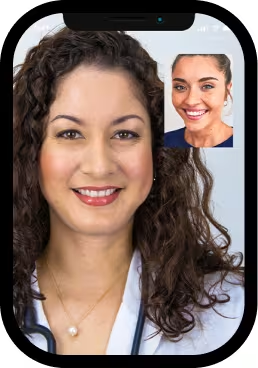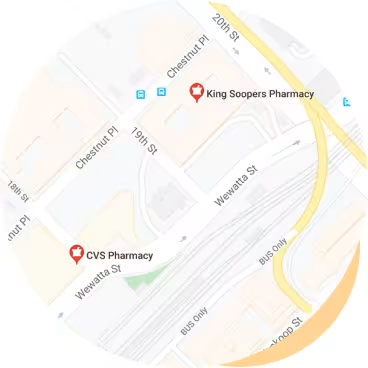- Chronic Care
- Heart Disease Management
High Cholesterol
High cholesterol treatment available today
Request high cholesterol treatment online from our trusted, board-certified doctors and find relief from pain and discomfort today. Get a new prescription to treat high cholesterol or refill an existing prescription today.*
Book an appointmentExpert screening for High Cholesterol
Ease pain and discomfort
Same-day appointments to evaluate High Cholesterol symptoms
*Prescriptions are provided at the doctor's discretion. Learn more about our controlled substances policy and how to save up to 80% with our prescription discount card. PlushCare doctors cannot treat all cases of high cholesterol. Our primary care physicians can conduct an initial evaluation of your symptoms but may need to refer you to a specialist or for in-person treatment. If you are experiencing life-threatening symptoms, seek emergency medical attention immediately.

Learn about high cholesterol
Cholesterol is a waxy substance that serves multiple functions within the human body. It serves a purpose in association with sex hormones, human tissue, and bile production.
A common misconception is an idea that cholesterol is bad for the body. The body needs cholesterol but at moderate levels. High cholesterol levels can cause multiple heart health-related issues, such as heart attacks and heart disease.
Generally speaking, an ideal total cholesterol level should be lower than 200. However, the values of HDL and LDL levels are just as important. High-density lipoprotein (HDL) removes "bad" cholesterol from the body, also known as low-density lipoprotein (LDL). Ideally, your HDL should value should outweigh your LDL values for a good cholesterol level.
High cholesterol causes
High cholesterol is caused by many factors. Genetics, lifestyle choices, and health conditions can all contribute to high cholesterol.
Unhealthy diet: A diet high in saturated and trans fats can lead to high cholesterol. Saturated fats are found in animal products such as red meat, butter, and cheese. Trans fats are found in processed foods such as crackers, cookies, and margarine.
Lack of exercise: Physical inactivity can lead to high cholesterol. A sedentary lifestyle combined with an unhealthy diet can be a recipe for disaster.
Smoking: Smoking damages the lining of your arteries, leading to plaque buildup and high cholesterol.
High blood pressure: High blood pressure forces your heart to work harder, leading to plaque buildup and high cholesterol.
Medical history: If you have a history of medical conditions such as heart disease, you may be at increased risk for high cholesterol.
Age and gender: Your cholesterol levels rise as you age. Men are also more likely than women to have high cholesterol.
Being overweight: Excess weight can raise your cholesterol levels.
Smoking: Cigarette smoking damages the walls of your blood vessels, making them more likely to collect plaque.
Symptoms of high cholesterol
Often, high cholesterol doesn't cause symptoms. But that's why it's important to get your cholesterol checked regularly. If you have high cholesterol, you may eventually develop hardening of the arteries (atherosclerosis). This condition can lead to heart disease, heart attack, or stroke.
If you have atherosclerosis, you may experience:Chest pain or discomfort (angina)
Pain in your legs when walking (intermittent claudication)
Heart attack
Stroke
How to treat high cholesterol
If you have high cholesterol, there are lifestyle changes and medications you can take to lower your cholesterol and reduce your risk of heart disease, heart attack, and stroke.
Lifestyle Changes
Making healthy lifestyle choices is the first step in treating high cholesterol. These include:
Eating a healthy diet
Exercising regularly
Reducing stress
Dietary Changes
Eating a healthy diet is one of the most important things you can do to lower your cholesterol. A healthy diet includes:
Plenty of fruits, vegetables, and whole grains
Lean protein, such as fish, chicken, and tofu
Low-fat or non-fat dairy products
Healthy fats, such as olive oil, nuts, and avocados
Exercise
Regular exercise can help lower cholesterol and reduce heart disease risk. Exercise has many other benefits as well, including:
Lower blood pressure
Improved circulation
Reduced stress levels
Medications
If lifestyle changes alone aren't enough to lower your cholesterol, your doctor may prescribe cholesterol medication. One common medication is a medicine called statins. Other common cholesterol-lowering medications include:
Niacin
Fibrates
Bile acid sequestrants
Cholesterol absorption inhibitors
Probucol (rarely used)
PCSK9 inhibitors (newer class of drugs)
High cholesterol medications
Statins
Statins are the most common type of cholesterol-lowering medication. They work by inhibiting an enzyme in your liver that is needed to produce cholesterol. Statins can be very effective in lowering LDL ("bad") cholesterol and may also help raise HDL ("good") cholesterol. Common statins include:
Niacin
Niacin is a vitamin that can also be used to lower cholesterol. It works by inhibiting the liver's ability to make cholesterol. Niacin is available in an over-the-counter (OTC) supplement and in prescription form. Common prescription niacin products include:
Fibrates
Fibrates are a type of medication that lowers triglycerides and can also raise HDL cholesterol. Common fibrates include:
Bile acid sequestrants
Bile acid sequestrants are a type of medication that binds to bile acids in the intestines, preventing them from reabsorbing. This causes the liver to make more bile acids, which lowers cholesterol levels. Common bile acid sequestrants include:
Cholestyramine (Prevalite)
Colestipol (Colestid)
Cholesterol absorption inhibitors
Cholesterol absorption inhibitors are a type of medication that inhibits cholesterol absorption from the intestines. Common cholesterol absorption inhibitors include:
Probucol
Probucol is a medication that was once commonly used to lower cholesterol. Probucol works by inhibiting the liver's ability to make cholesterol and increasing cholesterol excretion from the body.
PCSK9 Inhibitors
PCSK9 Inhibitors are a new class of drugs that work by inhibiting a protein that causes LDL cholesterol to be reabsorbed into the bloodstream. PCSK9 inhibitors are injectable medications used in addition to statins in people who cannot get their LDL cholesterol levels low enough with statins alone. Common PCSK9 inhibitors include:
Evolocumab (Repatha)
Alirocumab (Praluent)

How to avoid high cholesterol
You can avoid high cholesterol by making healthy lifestyle choices and knowing your family history. Healthy lifestyle choices include eating a healthy diet, exercising regularly, quitting smoking, and reducing stress. If you have a family history of high cholesterol, you may be at higher risk of developing the condition. It would help if you talked to your doctor about ways to lower your risk.

When to see a doctor for high cholesterol
You should have your cholesterol checked via lab tests every five years starting at age 20. You may need to be checked more often if you have a family history of high cholesterol or heart disease. You may also need to be checked more often if you have other risk factors for heart disease, such as diabetes, high blood pressure, or obesity.
High cholesterol treatment FAQs
What are the symptoms of high cholesterol?
There are no symptoms of high cholesterol. Only a blood test called a lipid panel can reveal whether you have elevated cholesterol levels. According to the American Heart Association, people aged 20 years or older should have their cholesterol levels checked every four to six years.
Can an online doctor treat high cholesterol?
Yes, an online doctor may refer you to lipid testing and afterward discuss your lab test results with you. If you have elevated cholesterol levels or have previously been diagnosed with high cholesterol, the clinician will work with you to establish a treatment strategy. This may include changes to your diet and lifestyle, and potentially may include cholesterol-lowering medication.
How is high cholesterol treated?
High cholesterol is usually treated with a combination of lifestyle modifications and medication. Dietary changes include: reducing animal fats, salt, fruits, veggies, and whole grains while increasing fruits and vegetables and maintaining a healthy weight.
Exercise for at least 30 minutes daily, don't smoke or drink alcohol excessively, and reduce stress as much as possible. Physicians can also prescribe medications such as statins to help lower cholesterol. In some cases, other drugs may be necessary.What medications are used to treat high cholesterol?
Crestor, Rosuvastatin, Lipitor, TriCor, and Lovastatin are examples of common high cholesterol medications that our medical team prescribes.
3 simple steps to get treated for high cholesterol today

Step 1
Book a high cholesterol treatment appointment.
Book a same day appointment from anywhere.

Step 2
Talk to your medical provider regarding your high cholesterol symptoms.
Visit with a doctor on your smartphone or computer.

Step 3
If prescribed, pick up prescription for high cholesterol treatment.
We can send prescriptions to any local pharmacy.
Related conditions to high cholesterol
High cholesterol can cause several related conditions, including:
Atherosclerosis
Coronary heart disease
Heart attack
Stroke
If you have any of these conditions, it is important to talk to your medical team about ways to lower your risk of developing them.
High cholesterol treatment pricing details
How pricing works
Join our monthly membership and get discounts on your visits to receive high cholesterol treatment and a new prescription or refill on your current prescription.
Paying with insurance
Membership
$16.99/month
First month free
Visits
Copay
30 days of free membership
Same-day appointments 7 days a week
Unlimited messages with your Care Team
Prescription discount card to save up to 80%
Exclusive discounts on lab tests
Free memberships for your family
Cancel anytime
Visit price with insurance
Often the same as an office visit. Most patients with in-network insurance pay $30 or less!
We accept these insurance plans and many more:
Paying without insurance
Membership
$16.99/month
First month free
Visits
$129
30 days of free membership
Same-day appointments 7 days a week
Unlimited messages with your Care Team
Prescription discount card to save up to 80%
Exclusive discounts on lab tests
Free memberships for your family
Cancel anytime
Visit price without insurance
Initial visits are $129.
If we're unable to treat you, we'll provide a full refund.
High cholesterol treatment resources
Sources:
PlushCare is dedicated to providing you with accurate and trustworthy health information.
Mayo Clinic: "High Cholesterol - Diagnosis and Treatment." Mayo Clinic. Accessed on December 14, 2023, at https://www.mayoclinic.org/diseases-conditions/high-blood-cholesterol/diagnosis-treatment/drc-20350806.
American Heart Association: "Prevention and Treatment of High Cholesterol (Hyperlipidemia)." American Heart Association. Accessed on December 14, 2023, at https://www.heart.org/en/health-topics/cholesterol/prevention-and-treatment-of-high-cholesterol-hyperlipidemia.
NHLBI (National Heart, Lung, and Blood Institute): "Treatment of High Blood Cholesterol." NHLBI. Accessed on December 14, 2023, at https://www.nhlbi.nih.gov/health/blood-cholesterol/treatment.
PlushCare content is reviewed by MDs, PhDs, NPs, nutritionists, and other healthcare professionals. Learn more about our editorial standards and meet the medical team. The PlushCare site or any linked materials are not intended and should not be construed as medical advice, nor is the information a substitute for professional medical expertise or treatment.